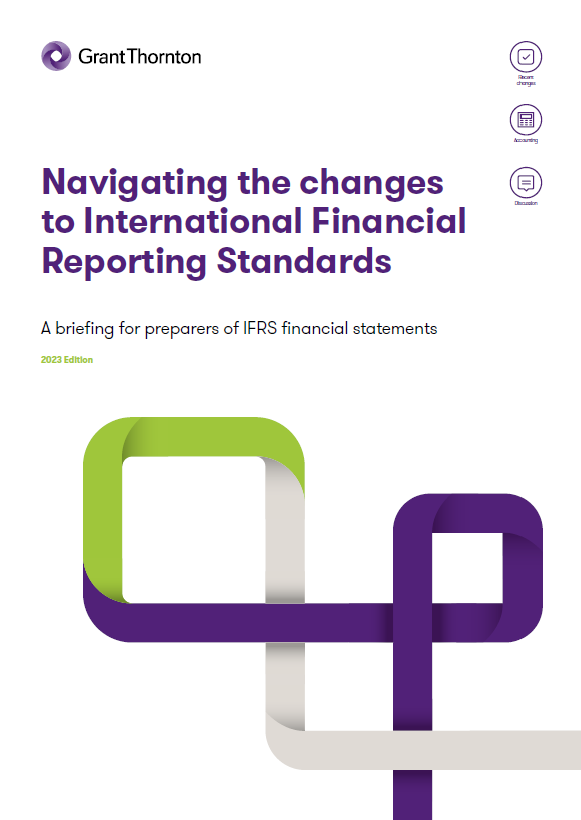-
Audit methodology
At Grant Thornton, we use a single audit methodology across our global network. This means that our clients gain the same proven, high-quality approach wherever they are.

-
Financial statements and consolidated financial statements
Preparation of monthly, quarterly or annual report and consolidated report on the basis of information presented by the client.
-
Financial Accounting
Effective bookkeeping and financial accounting are essential to the success of forward-thinking organisations. To get the optimum benefit from this part of your business, you'll need an experienced team behind you.
-
Tax compliance
Tax is likely to have an impact on almost every business decision you make. Whatever your business’s specific needs, we respond quickly and devise solutions tailored to you. We perform VAT, income tax, social tax and other tax accounting as well as present tax declarations to the tax authorities.
-
Chief financial officer service
Chief Financial Officer services include the periodic reporting, information systems standardization, internal document management and information flow optimization, budget preparation, cost accounting, cash flow and working capital management, financial analysis, investment return evaluation for managers.

-
International taxation
Grant Thornton operations in the Baltic States give us an access to the international expertise and allow advising the client on the minimisation of tax risks arising from conducting business in a foreign tax jurisdiction. We also consult foreign investors in finding an optimum group structure and form of enterprises in Lithuania and other Baltic States.
-
Transfer pricing
We advise the management bodies of local and multinational groups of companies in issues concerning transfer pricing of intra-group transactions and, if necessary, in the preparation of the relevant compliance documents. We also assist in preparing transfer pricing policies in order that future transactions are priced in accordance with the local as well as international regulations.
-
VAT refunds
We advise foreign clients in issues concerning the refund of value added tax paid in Lithuania, and Lithuanian clients – in the refund of value added tax paid in the EU member states. If necessary, we carry out these procedures on behalf of the client.
-
Profit tax, tax incentives
Our tax advisory department consults local and international clients in both everyday and specific taxation issues related to business activities.
-
Due diligence
Making the right investment decision can have a significant impact on shareholder value. To make an informed investment decision and create the best value from the transaction you will need the following an understanding of the target business identification and understanding of key business drivers an understanding of all the relevant issues clear analysis, conclusions and recommendations.
-
Assistance and representation during tax investigations, inspections, disputes
We provide services for registration in the Register of Taxpayers and the Register of VAT Payers. We represent clients' interests in tax disputes at the State Tax Inspectorate, Tax Disputes Commission, courts and other institutions.

-
Legal advisory for business start
We assist to quickly establish a company, branch or permanent establishment in Lithuania, open a bank account, VAT registration and obtain all necessary licenses for activity.
-
Legal advisory for business development
Our team has gained the greatest experience in advising international companies on the management of groups of companies. We advise and implement reorganizations or liquidations. Together with a team of tax and financial advisors, we perform a comprehensive due diligence (tax, legal & financial).
-
Labor law for CEOs and employees
We provide modern labor law solutions for the CEO, C-level managers and employees, which are tailored specifically to your business industry. We will take care of well-judged employment contracts and benefits package, protection of confidential information and non-compete agreements, handling of employee data or stock option rules, posting of employees, employment of EU and third-country nationals, organization of telework.
-
Fintech
With extensive experience in money laundering prevention and compliance and a strong team of financial experts, we advise clients on financial services, electronic money, licensing of payment institutions, capital formation, listing of mutual lending platform operators and other operational issues.
-
Migration and relocation
We assist you, your family members and employees of the organization to obtain national and European Union (Schengen) visas, residence permits, e-resident status, provide mediation letters and ensure a smooth relocation to Lithuania.
-
Due diligence
Making the right investment decision can have a significant impact on shareholder value. To make an informed investment decision and create the best value from the transaction you will need the following an understanding of the target business identification and understanding of key business drivers an understanding of all the relevant issues clear analysis, conclusions and recommendations.
-
Fintech advisory
The rapidly changing world and evolving technology are driving the development of new business models such as acting as a payment institution, a provider of virtual currency services and a financial institution. Grant Thornton Baltic provides support and advice to these companies.
-
Corporate finance management
Building a successful business requires a clear vision backed by a focused strategy. To achieve this vision, businesses must negotiate an increasingly complex environment.
-
Business Valuations
Choosing the right valuation method is the most important element in the process of estimating the fair value of a business as it must be adequate in terms of the purpose and object of the valuation. Grant Thornton uses only proven and generally accepted methods from among the wide range of income, asset and market approaches. Having conducted a preliminary analysis of the object and purpose of the valuation, we identify the method that will be the most appropriate considering the situation and characteristics of a given enterprise and the business sector in which it operates. Prior to commencing valuation, we also identify the documents necessary in the process.
-
Mergers and acquisitions
We provide advice to clients in all material aspects of the process of conducting transactions: finding a candidate for buyer, purchase or merger, initial analysis and valuation, negotiations, due diligence, structuring transaction price, preparing legal documentation and formal closing of the transaction. We also provide consultation for management buyouts.
-
Protection of Interests of Bondholders'
Grant Thornton provides bondholders' advocacy and protection services. We have resources, knowledge and the latest technology. Defending the interests of bondholders · Representing the interests of bondholders
-
External Financial Management Services
Providing an external financial management services makes it possible to manage a company’s finance on a day-to-day basis by a competent economist, without the need of offering full-time employment. By cooperating with experts on managing big-budget projects, we provide our clients with excellent support in comprehensive management of company’s finance.
-
Training
Financial Management Training and Seminars. Our experts have significant regional competence and close co-operation with our global colleagues. They happily share their expertise with our clients.

-
Internal Audit Services for Financial Sector Companies Licensed in Lithuania
Internal audit services adapted to Lithuanian financial sector companies ensure compliance with regulatory acts, risk management and operational excellence.
-
Internal Audit Services for EU/Foreign Aid Projects
Internal audit for EU/foreign aid fund projects helps to ensure compliance of activities and related costs with requirements.
-
Internal Audit for the Companies Certified by ISO
Internal auditing ensures ISO standard compliance, evaluates management system effectiveness, and gathers objective evidence of performance.
Key Lithuanian tax changes as of 2022
Changes in corporate taxation
- As of 31 January 2022, the transitional provisions applicable to the United Kingdom (UK) under which UK was treated as an EU Member State will expire and UK will be treated as a non-EU Member State.
- From 1 May 2022, the requirement for companies to account stock on a first-in, first-out (FIFO) basis for income tax purposes is abolished.
- As of 31 January 2023:
- The Law on Corporate Income Tax has been supplemented with a definition of hybrid entities and inclusion to tax base of hybrid entity’s income that was not taxed otherwise;
- The amendment to the law stipulates that in the case of a large investment project relief, the preferential income tax treatment (for income from the use of intellectual property) may be applied only to those who actually carry out research and experimental development activities and subsequently receive income from the use of the relevant intellectual property.
Changes affecting payroll
- Personal income tax law amendments change calculation of non-taxable income from 1stof January, 2022 - two formulas will be used to calculate tax-exempt amount, also fixed tax-exempt values will be altered.
- When gross salary is less than minimum salary as of January 1 (year 2022 – 730 EUR) – fixed monthly non-taxable amount of 460 EUR to be used (previously 400 EUR);
- When gross salary is between 730 EUR and 1678 EUR, the formula shall be:
Monthly non-taxable income = 460 – 0,26 x (earned monthly salary - minimum monthly salary). - When gross salary exceeds EUR 1 678, the following formula shall be applied:
Monthly non-taxable income = 400 – 0,18 × (earned monthly salary – 642).
Accordingly, for gross salaries above 2864 EUR/month, the non-taxable income formula becomes irrelevant / cannot reduce tax liabilities anymore.
- Participants in Pensions savings scheme contribution rate increases from 2,4% to 2,7%. No changes for those whose rate already was 3%.
Changes in the Personal Income Tax
Increase in average wages raises progressive rate threshold from 2022, as shown in the table below.

* Illness, maternity, paternity, parental leave pays and payments from long-term unemployment fund are not included into income from which progressive PIT is calculated.
Increase of excise duties and related changes
- As of 1 January 2022, excise duties were increased, new list of rates is available online here.
- An excise relief for small brewers has been introduced and the concept of heated tobacco and its taxation scheme has been introduced.
- The amended rules for filling in the accounting journal of excise warehouses enter into force.
Changes in the Tax for Environmental Pollution
From 2022 January 1 packaging fees are rising. Instead of the previous single tariff for all types of packaging, different tariffs are set depending on whether the packaging is reusable and recyclable or non-recyclable.
Intrastat reporting changes
From 1 January 2022, Intrastat reporting thresholds are increasing, as shown in the table below.

Changes in tax administration
- Payment service providers will be required to collect, store and provide data on cross-border payment transactions to the tax administrator from 2024 onwards.
- For all taxpayers, from 2023 there will be an obligation to record the data of payments for goods and services sold or purchased.
Changes in regulation on crowdfunding interest income
As of 10 November 2022, the Law on Crowdfunding is repealed. Accordingly, the tax relief for interest provided through the crowdfunding platform will no longer be subject to local regulations, but directly to the to the Regulation of the European Parliament and of the Council of 7 October 2020 (EU) No 2020/1503. It should be noted that the Regulation provide a transitional period of one year (until 9 November 2022) during which operators of crowdfunding platforms may continue to provide services under national law or start providing services under the Regulation as soon as they have been authorized.
Future tax reforms are expected
The Ministry of Finance is preparing a draft tax reform, which it intends to publish for public consultation in the first half of 2022, with a view to entry into force from 2023.
Expected changes:
- The Real Estate Tax Base is likely to expand;
- The tax burden on self-employed persons is likely to increase;
- Income tax, Personal income tax and similar reliefs are likely to be eliminated or reduced.



